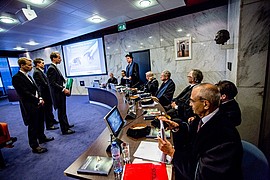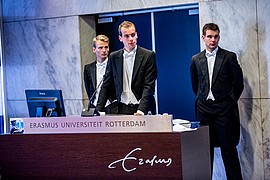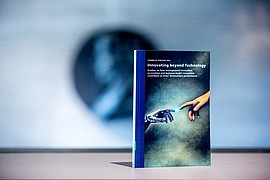PhD defence: Innovating beyond technology: Studies on how management innovation, co-creation and business model innovation contribute to firms’ (innovation) performance

In his dissertation ‘Innovating beyond technology: Studies on how management innovation, co-creation and business model innovation contribute to firms’ (innovation) performance’, ERIM’s Cornelis Heij examines how and under which conditions several types of non-technological innovation contribute to overall firm performance. Three non-technological types of innovation are explored, namely: management innovation, co-creation with customers, and business model innovation. Throughout his paper, Cornelis Heij advances our understanding of how management innovation and co-creation with customers contribute to exploitative and exploratory product and service innovations, and provides insight into two basic types of business model innovation and their relation to firm performance.
Cornelis Heij defended his dissertation in the Senate Hall at Erasmus University Rotterdam on Thursday, 1 October 2015 at 13:30. His supervisors were <link people henk-volberda>Professor Henk Volberda and Professor Frans Van Den Bosch. Other members of the Doctoral Committee were <link people shahzad-ansari>Dr. Shahzad Ansari (RSM), Professor Julian Birkinshaw (London Business School), Professor Jan Cornelissen (Erasmus University), Professor Fariborz Damanpour (Rutgers Business School), Professor Dries Faems (Rijksuniversiteit Groningen), and Professor Aard Groen (University of Twente)
About Cornelis Heij

Cornelis Vincent ‘Kevin’ Heij was born on 18 December 1985 in Krimpen aan den IJssel. After finishing his studies in Technology Management at the Technological University Rijswijk and Business Administration at the Erasmus University Rotterdam, he became project manager at the research institute INSCOPE – Research for Innovation, combining this with PhD research at the Rotterdam School of Management, Erasmus University. His research interests include ambidexterity, business model innovation, competitive strategies, contingency theories, and complementary effects between technological and non-technological types of innovation, such as management innovation. These types of non-technological innovation are also known as ‘social innovation’ in the Netherlands.
His work has been presented at many annual international conferences such as the Strategic Management Society (Prague, 2012; Madrid, 2014) Academy of Management (Philadelphia, 2014; Vancouver, 2015), European Academy of Management (Rotterdam, 2012; Istanbul, 2013; Valencia, 2014; Warsaw, 2015), and the European Group for Organization Studies (Helsinki, 2012; Montreal, 2013; Rotterdam, 2014). He has also presented at more themed conferences such as the special conferences of the Strategic Management Society (Geneva/Lausanne, 2013; Copenhagen, 2014; St. Gallen, 2015) and the European Academy of Management (Rotterdam, 2011; Montpellier, 2015). He has also organized national and international conferences and was co-chair of the business model innovation track of the 2015 annual meeting of the European Academy of Management. The courses he has taken include the summer seminar on “Evolutionary Perspective on Strategic Management” at the Wharton School, University of Pennsylvania in 2012.
In addition to two scientific publications and two publications in The Academy of Management Proceedings (2014 and 2015), he has acted as guest editor for special issues on management innovation and on social innovation for the European Management Review and M&O: Tijdschrift voor Management en Organisatie respectively. His recent publications include several books on business model innovation, Re-inventing business: how firms innovate their business model (Van Gorcum, 2013, ISBN: 978 90 232 5146 0), and The new business model of financial advice: from provision to value creation (Mediawerf, 2014, ISBN:978 94 90463 33 5), annual reports on innovation in specific industries and on Dutch firms, i.e. Erasmus Competition and Innovation Monitor, and he has also written articles for journals that target a broader audience, such as Economisch Statistische Berichten, FD Outlook, Het Verzekerings-Archief, and Tijdschrift voor HRM. Together with his supervisors, he has received multiple awards for his work. His book Re-inventing business: how firms innovate their business model received the ERIM 2014 Award for the Best Book in the Domain of Research in Management. The study Management Innovation: Management as Fertile Ground for Innovation was awarded the European Management Review best paper award in 2013. The study To Replicate or to renew your business model? The performance effect in dynamic environments received the best paper award in the innovation track of the EURAM 2014 Annual Conference.
Thesis Abstract

Innovation is generally considered to be a cornerstone of organizational survival in many of today’s dynamic and competitive markets. However, the technological domain of innovation has received prevalent attention. This dissertation goes beyond the dominant focus on technological innovation in innovation studies by examining how and under which conditions several types of non-technological innovation contribute to firm performance. To accomplish this goal, it focuses on three non-technological types of innovation that recently have received increased attention to be important sources of competitive advantage: management innovation, co-creation with customers, and business model innovation. The studies presented in this dissertation advance our understanding of how, and under which conditions, management innovation and co-creation with customers contribute to exploitative and exploratory product and service innovations. They also provide new insights into how and at which levels of environmental dynamism two basic types of business model innovation, i.e. replication and renewal, contribute to firm performance.
Study I identifies common and emerging areas of research, and sets a series of research priorities for management innovation. Study II finds that investments in research and development (R&D) have an inverted U-shaped effect on radical product innovations, in particular for firms with lower levels of management innovation. However, in firms with high levels of management innovation, this relationship becomes J-shaped. Study III shows that new management practices, i.e. management innovation, have an increasingly positive effect on a firm’s exploitative innovation performance. However, the larger the firm, the more this relationship moves from a positive linear relationship to one that is more J-shaped. Study IV finds that co-creation with customers, conceptualized as relationship learning, has an inverted U-shaped effect on exploitative innovation, while the effect of this learning on exploratory innovation is positive. Additionally, the informal coordination mechanism connectedness among organizational members flattens the negative effect of higher levels of relationship learning with customers on exploitative innovation. Finally, Study V advances our understanding by differentiating between and conceptualizing two basic types of business model innovation, replication and renewal, and by describing their key characteristics. Additionally, it shows that environmental dynamism weakens the positive effect of business model replication on firm performance, while business model renewal contributes more strongly to firm performance in environments characterized by intermediate and high levels of dynamism than in relatively stable settings, i.e. with low levels of dynamism.
All in all, these five studies advance our understanding of how, and under which conditions, management innovation, co-creation with customers, and business model innovation contribute to firm performance and it provides multiple avenues for future research that should further reveal the importance of innovating beyond the technological domain.
· View and download Cornelis's dissertation
Photos: Chris Gorzeman / Capital Images


